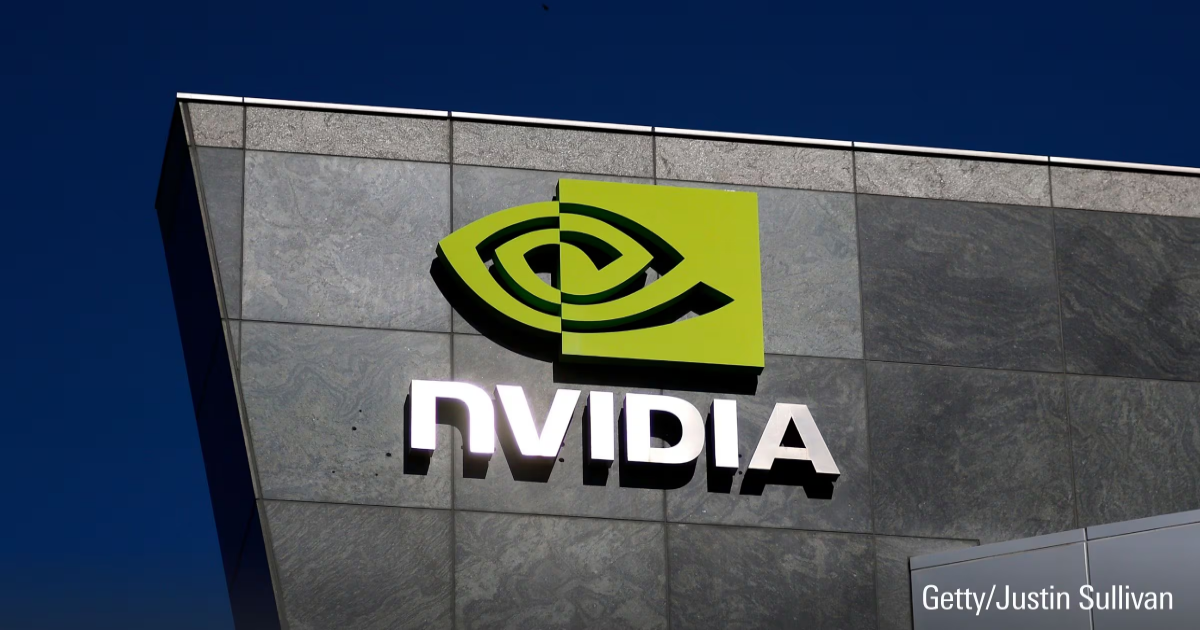- On Wednesday, Nvidia became the first company to hit $4 trillion in market capitalization.
- The chipmaker is the face of the AI boom, manufacturing the hardware and software that power generative AI applications.
- Shares of Nvidia have returned 280% over the past two years, compared with a 45% return for the broader US market.
The buzziest stock on Wall Street just reached a new milestone. Nvidia NVDA, the chipmaker that is powering the artificial intelligence boom, saw its market capitalization briefly surpass $4 trillion on Wednesday. That’s the highest valuation ever recorded for a publicly traded company.
Shares closed at $162.88 on Wednesday afternoon, down from an intraday high of $164.42. That close left Nvidia with a market cap of $3.97 trillion, just shy of its record earlier in the day.
Nvidia produces the hardware and software tools that are necessary to power generative AI programs like ChatGPT. It has been the most high-profile beneficiary of insatiable investor demand for the new technology. Thanks to its size, the firm has had an outsize impact on the returns of the entire stock market over the past two years.
Despite concerns surrounding mounting competition in the AI space from tech giants like Alphabet GOOG and Microsoft MSFT, Morningstar analysts believe Nvidia will remain dominant in the market for years to come. “In the long run, we expect tech titans to strive to find second sources or in-house solutions to diversify away from Nvidia in AI, but most likely, these efforts will chip away at but not supplant Nvidia’s dominance,” Morningstar senior equity analyst Brian Colello wrote in May. Amid its record-breaking rally, Morningstar sees Nvidia as fairly valued with a price to fair value ratio of 1.14.
Nvidia Key Metrics
Nvidia’s Massive Rally
Since its public listing in 1999, Nvidia’s returns have far outpaced the broader US market. The bulk of that outperformance has come in the past three years, after ChatGPT’s 2022 release broke open the floodgates for generative AI applications. Over the past two years, the tech giant has returned more than 280%, consistently surprising market watchers with quarter after quarter of blockbuster results.
Nvidia’s market cap crossed the $1 trillion threshold in May 2023, and the $3 trillion threshold a little more than a year ago in June 2024.
Nvidia stock struggled in the early months of the 2025, as Chinese competitor DeepSeek made headlines with AI technology that offered performance on par with leading market models at a fraction of the cost. This raised serious doubts about the long-term need for the expensive infrastructure that drives Nvidia’s business. Then, as a global trade war loomed, investors turned away from riskier AI bets. But amid a pause in tariffs and new confidence in demand for its chips, shares of Nvidia have climbed more than 25% since the stock market bottomed out on April 8.
Passing Microsoft, Leaving Apple in the Dust
Nvidia surpassed Microsoft to become the largest company in the world earlier this summer. The software giant’s market cap stands near $3.8 trillion. For most of the last decade, the distinction belonged to Apple AAPL. The iPhone maker consistently made headlines as its market cap climbed to record levels. It was the first company to reach a $3 trillion valuation in January 2022. That year marked the beginning of a bear market for US stocks, and Apple struggled (and recovered) alongside the majority of stocks.
But as the demand for AI pushed Nvidia to new highs over the past two years, Apple fell behind its mega-cap tech peers, amid concerns that it was lagging in the AI race. Slowing growth, declining iPhone sales, and regulatory pressure in Europe didn’t help.
Nvidia’s market cap now surpasses that of some countries’ entire stock markets, including Canada and the United Kingdom. It’s only slightly smaller than the equities market in Hong Kong, and it’s roughly one-third the size of all the publicly traded companies in China.
As Nvidia’s market cap has grown, it has become an increasingly large driver of overall market returns. Nvidia, which holds a 6.8% weight in the Morningstar US Large-Mid Index, contributed 2.4 of the 11.4 percentage points gained by the index in the second quarter of 2025. The next-largest contributor, Microsoft, added 1.9 points.
The first and second quarters of 2024 saw even more concentration, with Nvidia contributing 2.3 of the 10.6 points gained by the index in the first quarter and 1.7 of the 4.0 points gained by the index in the second. In other words, Nvidia contributed nearly half the market gains in the second quarter of 2024.
